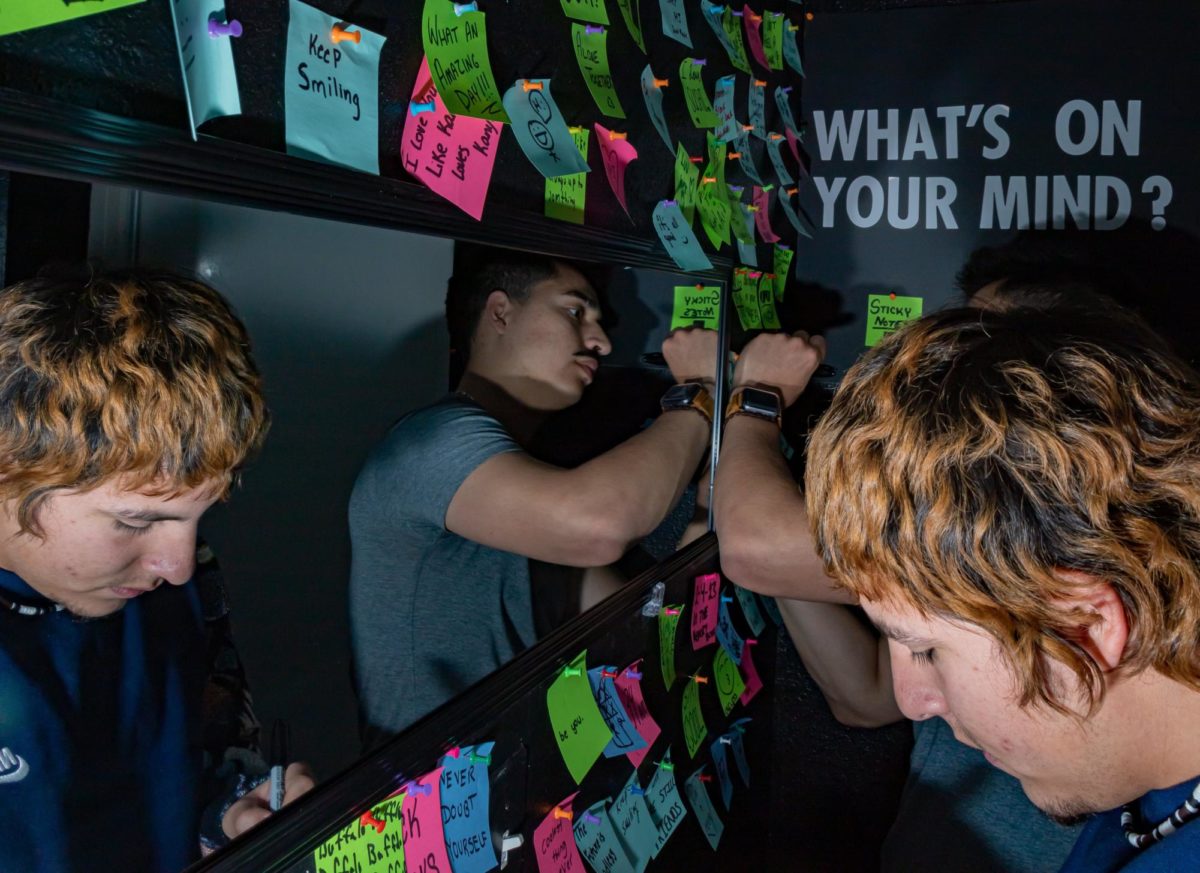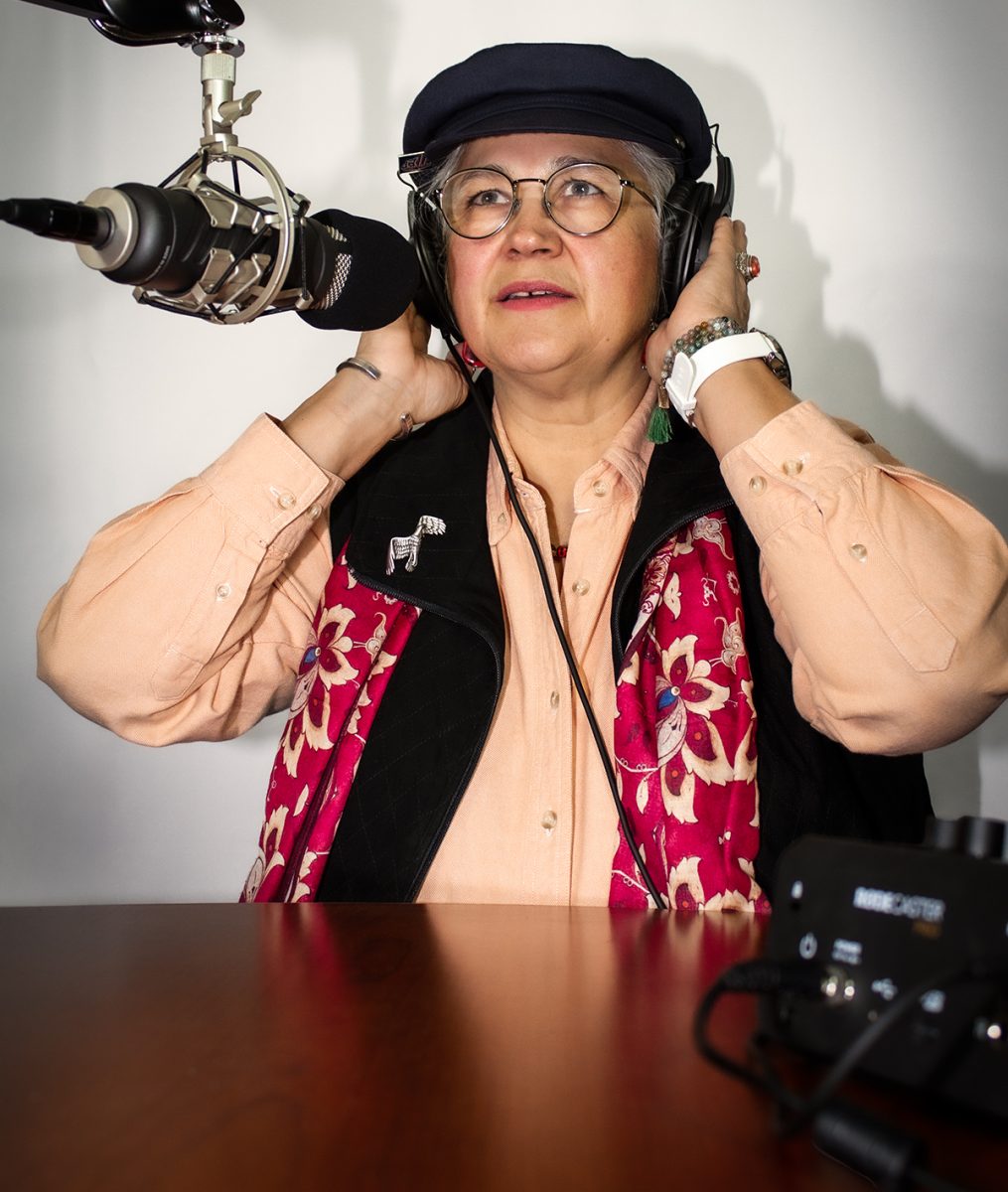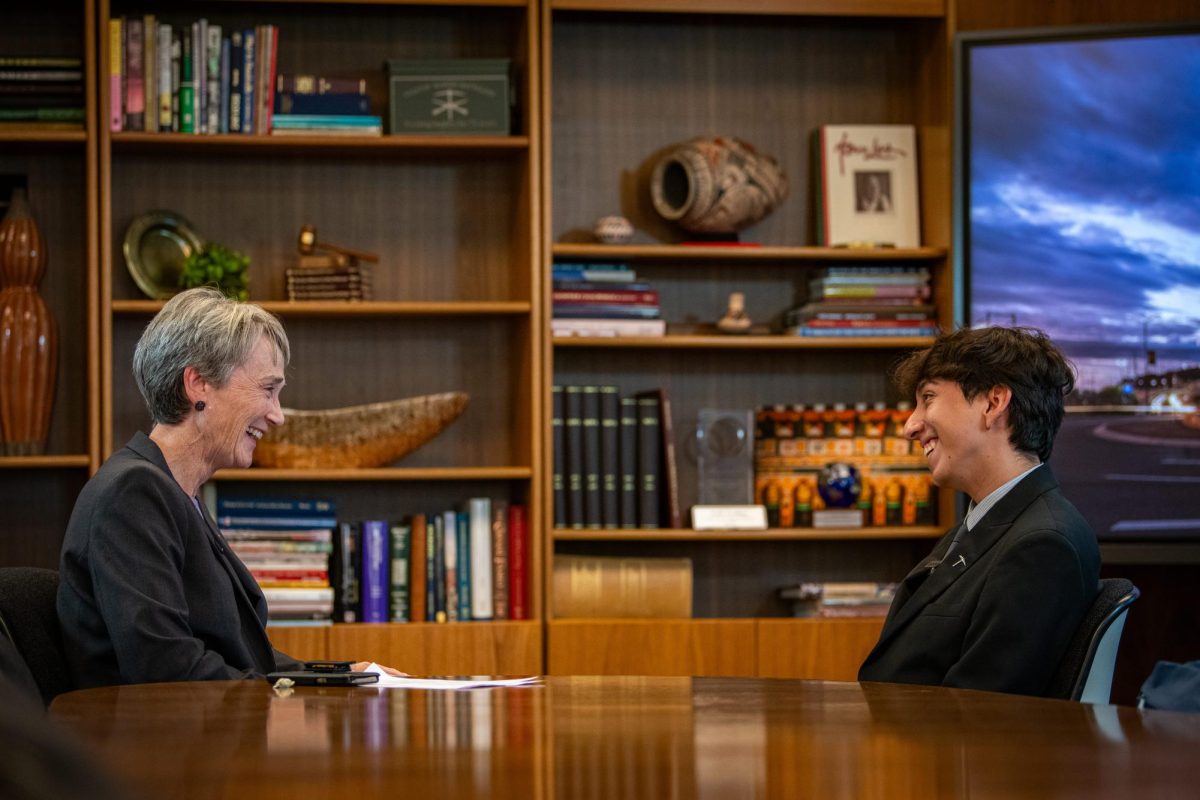Neon lights mix with the desert sun as you open the door to Flair Shot, flashing greens, pinks and purples catch your eye while the door slowly shuts. An indoor airsoft target range, with the tell-tale sounds of retro arcade games spilling in from the back room behind the neon targets. You may even step on the small plastic pellet used as ammunition for the airsoft target range at the establishment.
One of the four owners walks up to greet you, sporting a notably young face. Angel Rios, a 21-year-old junior student at UTEP’s Woody L. Hunt College of Business, welcomes you in. Rios had always wanted to own a business, remembering that even as a child, entrepreneurship was his passion
“It allows you to be your own boss,” Rios said. “I don’t regret it.
Rios is majoring in general finance, with a minor in commercial real estate – a new program at UTEP-, and opened Flair Shot with three other partners in November 2022, getting the idea when the group visited San Diego, California.
“El Paso has nothing like it,” Rios said. “We decided to add an arcade, just to make it more of a hangout spot.”
The weekends are their bread and butter, with families being their most substantial clientele followed by younger couples. Most clients opt-in for the combo package, which offers 75 pellets for the airsoft targets and an hour in the retro arcade.
Rios and partners had little to no time to advertise their business.
According to Rios, marketing is something that has helped their business flourish.
Besides handing out flyers, stickers and other promo materials, Rios has been posting regularly to the company’s Instagram, wanting to pay for ad space in the near future.

“Your drive dictates your success,” Rios said. Recognizing that if they do not promote their business themselves, no one else will.
Rios and his partners have paid for advertisements on FitFam. This locally-run account posts local news and gossip, as well as promotions for businesses in the greater El Paso area, allowing the community to find new businesses to visit and support.
Rios points to YouTube as his main source of knowledge, but thanks UTEP for a more in-depth understanding of finances, accounting and marketing.
Although, what the program is lacking, Rios notes, is the “real-world” experience. UTEP offers many classes in business- related fields, but one taught by Erik Pavia, a clinical professor from the Woody L. Hunt College of Business, and instructor for a course on startups, helps students understand what it takes to start and grow a business.
“You can look at a new venture in, I think, two different lights,” Pavia said.
Describing that a new venture could describe how long a business has been operating, but for others, it is more difficult to figure out. The other description he gives is based on the business’ progress.
“The company could be developed on research that’s taken five to ten years to develop,” Pavia said. “I think that sort of qualifies new ventures because they’re at a similar stage as a company.”
Rios and his partners, using Pavia’s descriptions, would fall under the latter definition, being a newly formed company.
“We made a lot of mistakes,” Rios said. “No one ever teaches you about how it actually is, or all the city people you need to speak to.”
There are several steps to starting a business in the State of Texas. The first step is mapping out your business plan.
As described by the Texas Economic Development (TED) Office, this is a dynamic road map for your business, which outlines the main purpose and value proposition of the business. This map gives the business a structure and sets financing and competitive advantages.
The second step requires prospective owners to choose a location for their business, for which the TED Office recommends looking at zoning ordinances in potential areas, that benefit the business.
The third step, is financing the business, followed by structuring and registration of the business. Sole proprietorships and partnerships will need to register the business name, or assumed name, with the county clerk’s office to get it off the ground.
The last steps are arguably the most crucial. Determining the potential tax responsibilities of the business, federal and state employee requirements and applying for, and gaining the necessary business licenses and permits.
Employment, according to Pavia is one of the most important steps, as it could help progress the business exponentially.
“If you’re missing skill sets, if you don’t know how to program, if you don’t know how to build a building,” Pavia said. “Try to recruit people who can help you or learn how to do those things and make whatever progress you can.”
A general business license is not required in Texas, but potential business owners must determine the necessary licenses or permits they may need to run their businesses, according to the TED Office.
Despite of what might look like a long list of steps required to start a business, there are less regulations in the State of Texas compared to other areas in the United States. “El Paso and Texas are actually great places to start businesses from the perspective of the amount of regulation you have to deal with,” Pavia said. Luckily though, Rios has not faced any discourse for being a student.

“People kind of get shocked by it (being a business owner at a young age),” Rios said. “I feel like it actually makes you stand out.”
Pavia believes that students can have a unique opportunity to start a business without other obligations that would hinder their ability to do so otherwise.
“You don’t have a full-time job, maybe you don’t have kids yet, maybe you’re not paying a mortgage,” Pavia said. “So one of the benefits of being a student is that you have a lot of flexibility to take risks.”
Rios also believes that starting a business is worth the risk, and advises others that want to take the plunge at a young age.
“It’s definitely worth the risk no matter what,” Rios said. “If it doesn’t pay off, at least you learn from that experience.”
But a big question is, when should someone, student or not, take that risk? To start, Pavia believes that students have the ability to learn, unlike those who are more separated from university life.
“You as a student who’s excellent at learning should be able to figure out how to comply,” Pavia said. “With you know, whatever the fire marshal code or the licenses for whatever it might be.”
Rios considers himself fortunate, because of the money he and his partners had in savings, there was no need to apply for any loans. They were also able to pull together much of the equipment they already had on hand and reallocate it toward the business.
Pavia, on the other hand, feels that finances are a necessity, whether it be by obtaining loans, or by fundraising to make potential business owners dreams a reality. He feels that it should not be what holds potential business owners back from moving forward.
“I think too many people use money as a form of permission,” Pavia said. “The best entrepreneurs don’t wait for permission, they’re going to do what they can with the resources they have available to them to move the company forward.”
Having just opened, Rios and his partners have not yet turned a profit on the business, but eventually, want to grow, and have it as a side income by the summer.
As a student, tuition is one of the most critical expenses, along with parking and other fees associated with each semester. Rios considers it a reason as to why they decided to open a business at a young age.
“It’s not cheap (tuition), and every year it just keeps rising, and there are more fees that you have to pay,” Rios said. “Making money is very important.”
Success can become an ambiguous term for those starting, or running their own businesses, but Pavia believes that it is dependent on the type of business, and the motivation of the owner in the long run.
“Sometimes, making money isn’t the only, or the best, reason to build,” Pavia said. “But if you’re not entirely motivated by that, figure out what you care about.”
Another factor was had to be considered by Rios and his business partners was the use of guns. In the wake of violence that has taken place in El Paso in recent memory, most notably, the killing of 23 people in an El Paso Walmart, which was carried out by an out-of-town gunman on Aug. 3, 2019, implications can be drawn from the use of firearms, airsoft or not. Rios tackles this by being open, honest, and educational in his approach to the subject.

Rios explains, that guns are not something one should use without the appropriate supervision, noting that, they have faced little pushback to their business’ use of airsoft guns with this method.
For students looking for assistance in starting a business, or who wish to connect with others, there are resources available for UTEP students that offer information, trainings, and networking opportunities.
Studio G, an entrepreneurial organization based out of UTEP’s Mike Loya building, provides business consulting and networking opportunities to help students and recent graduates launch their own businesses, according to its website.
The biggest opportunity comes in the form of potential funding pathways available to Studio G members.
Currently, Studio G offers three seasons of the “Studio G Podcast” which invites entrepreneurs to speak on their experiences and gives advice to those seeking to further their own entrepreneurial prospects.
UTEP’s Studio G branch is the only one in the State of Texas, with 16 similar models available for students in New Mexico universities and community colleges.
Another option, that is available for non-students as well, is Strive Now. A nonprofit started in 2022, that offers other networking, mentorship, community engagement and internship opportunities.
Strive Now offers “Hangouts” which invites like-minded students to meet with one another and discover their “purpose,” according to Strive Now’s website. Another offering is their “Connect” program, which offers connections to mentors, challenging attendants with workshops and taking part in ice breakers.
One piece of advice offered by Pavia encourages entrepreneurs to branch out, telling them not be afraid of breaking from the conventional path expected from them, even though that may be different from person to person.
IN BRIEF
Traducido por Yoali Rodriguez
Tener el lujo de estudiar y tener tu propio negocio no se construye de la noche a la mañana. Angel Rios, de 21 años, es un estudiante de negocios en UTEP, que ha aprendido lo que es ser parte de un negocio que mezcla la diversión de un campo de tiro y juegos de arcadia, llamándolo “FlairShot”.
Inspirados en el concepto durante un viaje a San Diego, California, Rios y sus tres socios tuvieron la idea de abrir un negocio único en El Paso. Inaugurando su arcadia y campo de tiro en noviembre 2022. Rios comenta que desde que inauguraron han tenido éxito localmente, sobre todo los fines de semana, los cuales usualmente se llenan por familias y parejas jóvenes.
UTEP ofrece diferentes cursos relacionados con el mundo de los negocios. Uno de los profesores de la Facultad de Administración de Empresas, Woody L. Hunt; Erik Pavia, enfoca sus enseñanzas
en ayudar a estudiantes a entender cómo empezar y cultivar un negocio en ciertos pasos: construir un buen plan de negocios, escoger la localización correcta, financiar y estructurar el negocio y por último, determinar que responsabilidad se tiene sobre los impuestos, requerimientos federales y estatales para generar empleos, además de obtener licencias y permisos.Comparando el contenido de los cursos de Pavia, y como construyó Rios su negocio, ellos entrarían en la categoría de start-up, teniendo poca práctica en el espacio de los negocios locales.
Fuera de seguir un plan letra por letra, Rios alienta a estudiantes a que emprendan su propio negocio para conseguir experiencia en el mundo, no solo lo que se aprende en los libros. Rios ha tenido la oportunidad de crecer por su creatividad y pasión por el proyecto.








